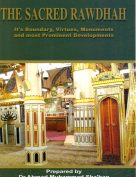
- Muhammad ibn Jarir al-Tabari
- State University of New York Press
- Franz Rosenthal
- 1989
- 239
- 15121
- 6422
- 5001
The History of Al-Tabari Volume 8
The History of al-Tabari :Tarikh al-Rusul wa’l muluk ‘Annals of the Apostles and Kings’ ,by Abu Ja’far Muhammad b Jarir al-Tabri (839-923). It is by common consent the most important universal history produced in the world of Islam.
The Victory of Islam
Volume VIII of al-Tabari’s great 40-volume history of the Arabs covers the history of the Muslim community and the biography of Muh’ammad in the middle Medinan years. During this period, Meccan resistance to Islam collapsed, Muh’ammad returned triumphantly to his native city, and the Muslim community weathered controversy in Muhammad’s private life.
This volume covers the history of the Muslim community and the biography of Muhammad in the middle Medinan years. It begins with the unsuccessful last Meccan attack on Medina, known as the battle of the Trench.
Events following this battle show the gradual collapse of Meccan resistance to Islam. The next year, when Muhammad set out on pilgrimage to Mecca, the Meccans at first blocked the road, but eventually a ten-year truce was negotiated at al-Hudaybiyah, with Muhammad agreeing to postpone his pilgrimage until the following year.
The Treaty of al-Hudaybiyah was followed by a series of Muslim expeditions, climaxing in the important conquest of Khaybar. In the following year Muhammad made the so-called Pilgrimage of Fulfillment unopposed.
Al-Tabari’s account emphasizes Islam’s expanding geographical horizon during this period. Soon after the Treaty of al-Hudaybiyah, Muhammad is said to have sent letters to six foreign rulers inviting them to become Muslims. Another example of this expanding horizon was the unsuccessful expedition to Mu’tah in Jordan.
Shortly afterward the Treaty of al-Hudaybiyah broke down, and Muhammad marched on Mecca.
The Meccans capitulated, and Muhammad entered the city on his own terms. He treated the city leniently, and most of the Meccan oligarchy swore allegiance to him as Muslims.
Source: kalamullah


















 Afar
Afar Afrikaans
Afrikaans Akan
Akan Albanian
Albanian Amharic
Amharic Armenian
Armenian Assamese
Assamese Avari
Avari Azerbaijani
Azerbaijani Basaa
Basaa Bengali
Bengali Bosnian
Bosnian Brahui
Brahui Bulgarian
Bulgarian Burmese
Burmese Catalan
Catalan Chami
Chami Chechen
Chechen Chichewa
Chichewa Circassian
Circassian Comorian
Comorian Czech
Czech Danish
Danish Dutch
Dutch Estonian
Estonian Finnish
Finnish Fulani
Fulani Georgian
Georgian Greek
Greek Gujarati
Gujarati Hausa
Hausa Hebrew
Hebrew Hungarian
Hungarian Icelandic
Icelandic Indonesian
Indonesian Ingush
Ingush Japanese
Japanese Jawla
Jawla Kannada
Kannada Kashmiri
Kashmiri Katlaniyah
Katlaniyah Kazakh
Kazakh Khmer
Khmer Kinyarwanda
Kinyarwanda Korean
Korean Kurdish
Kurdish Kyrgyz
Kyrgyz Latvian
Latvian Luganda
Luganda Macedonian
Macedonian Malagasy
Malagasy Malay
Malay Maldivian
Maldivian Maranao
Maranao Mongolian
Mongolian N'ko
N'ko Nepali
Nepali Norwegian
Norwegian Oromo
Oromo Pashto
Pashto Persian
Persian Polish
Polish Portuguese
Portuguese Romani - gypsy
Romani - gypsy Romanian
Romanian Russian
Russian Serbian
Serbian Sindhi
Sindhi Sinhalese
Sinhalese Slovak
Slovak Slovenian
Slovenian Somali
Somali Swahili
Swahili Swedish
Swedish Tagalog
Tagalog Tajik
Tajik Tamazight
Tamazight Tashamiya
Tashamiya Tatar
Tatar Thai
Thai Tigrinya
Tigrinya Turkish
Turkish Turkmen
Turkmen Ukrainian
Ukrainian Urdu
Urdu Uyghur
Uyghur Uzbek
Uzbek Vietnamese
Vietnamese Yoruba
Yoruba Zulu
Zulu